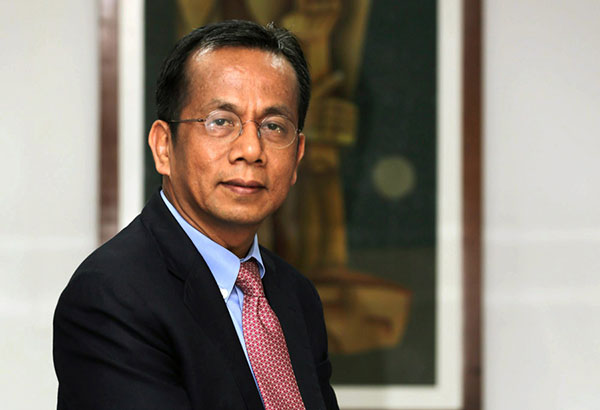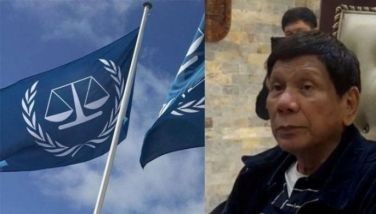PCC’s Arsenio Balisacan: Outrunning the competition

On running the PCC and running a marathon: “As with the discipline of running, I have to be very patient and I have to be very committed. I have to set a clear direction and a clear agenda. Just like in running, you have to plan it well so you can get to the next station. You need a lot of preparation.”
MANILA, Philippines — “Today,” says Arsenio Balisacan casually, “I didn’t run that much. It’s just to loosen my fit because I just finished a marathon.”
It is 8:30 on a warm Sunday morning and Balisacan, in full running gear, had just finished a 10-kilometer run around the University of the Philippines academic oval.
But the 60-year-old chairman of the Philippine Competition Commission (PCC) tells STARweek this is so much shorter than his usual 21-K gig and it’s all because he is still decompressing, having finished the Chicago Marathon just days before.
Not many people know that Balisacan is quite a runner. People usually see him in his dark suit or classic barong attending economic meetings and other government events as the no-nonsense chairman of the PCC.
The Philippine Competition Commission is the government body tasked to ensure that there will be enough competition among industries in the Philippines to protect customers.
It’s a tough job but Balisacan believes he is able to hurdle all the challenges of his job because of the discipline and many other values he has imbibed as a runner.
Balisacan is a serious runner, although he dismisses the label. “I just run for fun,” he says over breakfast after the morning’s run.
Yet his definition of a fun run is a regular 21 K several days a week. His staff knows when the world-renowned economist has not been able to run that day – he can be unusually cranky.
“They know the consequences,” he says in jest.
To be safe, his staff usually avoids setting meetings very early because they know that it’s Balisacan’s time on the ground.
How he discovered his love for running is a story that started at Waikiki Beach of Hawaii back in the day when he was a graduate student doing doctorate studies at the University of Hawaii.
The year was 1984. He was finishing his dissertation but there was something fundamentally lacking. While cracking his brains over the topic he chose for his dissertation, Balisacan decided to take a walk along Waikiki, hoping the sea breeze would clear his mind and give him some answers.
“I was trying to formulate a theoretical explanation on agricultural protection in developed and developing countries and why developed countries subsidize their farmers and developing countries tend to tax the sector,” he says.
That walk along the beach would change his life.
“One day, I walked along Waikiki Beach and then I saw this group of runners assembled in one place,” he recalls. The group huddled around tent, a running clinic.
“There was a medical doctor who would give tips on how you should pace yourselves and then they were ready to run,” he narrates.
Balisacan decided to join them.
“Just for curiosity, I ran with them,” he says.
And the rest, as they always say, is history. Balisacan started an intense love affair with running.
“My first serious run was the Great Aloha Run,” he shares. It was a 16K run.
“I was still studying. And then I never left running. There were years when I skipped long distance running but it has become a hobby. You get addicted to it. Oh, I think the term addiction is not right. I think I would say, therapeutic.”
Running, he says, helps him focus, allows him to de-stress and also contributes to his good health.
As a child, Balisacan was not athletic. He preferred to sit in one corner just reading and studying.
Born to a poor rice tenant and his wife, Balisacan grew up in a rice village at the foot of the Sierra Madre mountains where reading materials were very, very scarce.
So when he was able to go to school, he chose to just read and read. His love for learning never really stopped. He was always interested to learn about the bigger world outside the rice village where he grew up.
For college, his parents sent him to the Mariano Marcos State University in Ilocos because studying in Manila was not an option for the family.
The course available was agriculture because at the time, there was a global food crisis and governments all over the world went into massive agriculture programs. The Philippines responded as well.
After obtaining his Bachelor of Science in Agriculture from the university – graduating magna cum laude in 1979 – Balisacan took graduate studies at the University of the Philippines Los Baños in 1982.
During his student years, he was always curious that some of his teachers were doctors, even if they weren’t really medical doctors.
With this curiosity but more because he always wanted to learn so much more, Balisacan decided to get a PhD. He bagged a scholarship at the University of Hawaii and graduated in 1985.
And it was then that he was able to find an explanation to the question that was always on his mind, perhaps even in his subconscious as a farmer’s son who saw the hardships of planting rice.
By the time he finished his doctorate, he had found the answer to his question.
He concluded that government policy does not come out of a vacuum – it comes after intense lobbying.
The interests of farmers are not represented in the policy space.
“For them to make an effective lobby, they would have to organize. They are so scattered and the cost of transportation and communication is high,” Balisacan explains.
In short, the farmers could generate very little political pressure in the political space.
The capitalists, in comparison, are highly concentrated in urban areas.
“It’s easy for them to mobilize and both the industrialists and urban consumers exert and mobilize political pressure effectively toward food subsidy,” he adds.
“Now that explains why developing countries tend to penalize farmers,” Balisacan says.
This conclusion would guide him throughout his career.
When he returned to the Philippines, he continued doing research on this problem. He joined the academe, eventually becoming dean of the School of Economics of the University of the Philippines, Diliman.
He would later become the country’s socioeconomic planning secretary before former president Benigno Aquino III appointed him to his current position.
Balisacan’s journey from his family’s humble home had been a long one and filled with adventure. Initially, he just wanted to be able to finish school but his goal became much bigger – that of addressing inequality and achieving inclusive growth.
He is happy where he is and believes that as chairman of PCC, he is able to work on these goals. “My dream has also evolved. My world has changed. I’m no longer just interested in cotton but something more about development,” he says.
Throughout his career, running would be his weapon against all the challenges.
The PCC, created under Republic Act 10667 or the Philippine Competition Act, is mandated to implement the national competition policy by regulating anti-competitive conduct and protecting the well-being and efficiency of competition markets for the benefit of consumers and businesses.
It seeks to protect consumers by giving them more choices over goods and services at lower prices and to promote competitive businesses, large or small, that will, in turn, encourage economic efficiency and innovation in the country.
It was established with the premise that markets with enough competition directly benefit the poor. This is because competitive markets offer a wider variety of goods and services at the lowest possible prices.
There have been problems, but Balisacan has been able to face these challenges, thanks to the discipline he learned as a runner.
“As with the discipline of running, I have to be very patient and I have to be very committed. I have to set a clear direction and a clear agenda. Just like in running, you have to plan it well so you can get to the next station. You need a lot of preparation,” he says.
Now, with Balisacan at the helm, the PCC has indeed hit the ground running.
- Latest
- Trending

















